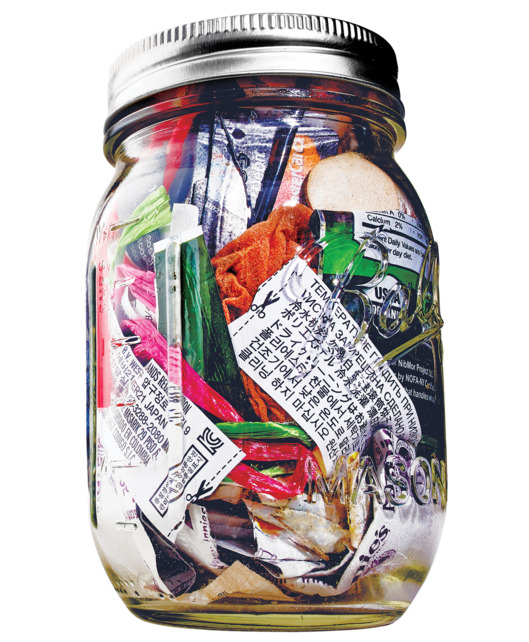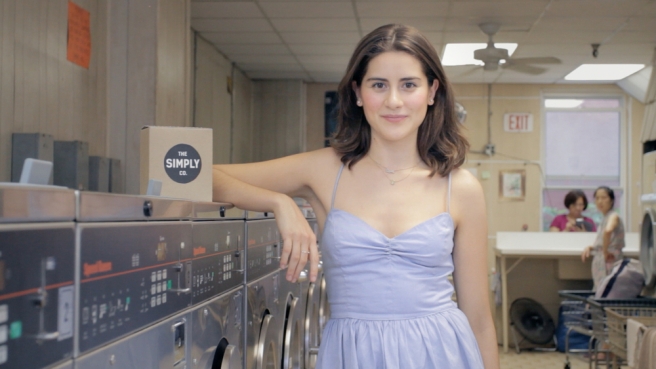Last month, perusing my Facebook feed, I was stopped mid-scroll by this New York Magazine article headline: “All My Trash Fits in a Single Mason Jar.” While we live in a country in which the average person produces 4.4 pounds of trash per day, this was no click-bait voodoo, but a legitimate, and important exposé. Lauren Singer is a 23-year-old New Yorker who in the last two years has produced so little un-recyclable waste that it all fits into one mason jar. Inspired by a particular incidence during her time at NYU, Lauren vowed to herself to live a trash-free existence in 2012. Read on to learn how she gradually made this change, and how you, too, can make small, but significant changes to positively impact the environment.

Twyla Shelmire: What inspired you to practice a “light footprint” lifestyle?
Lauren Singer: Everything started around 2012 when I was an Environmental Studies major at NYU. I was in my senior culminating course for my major, which every environmental studies major has to take, and there was a girl in my class who everyday would bring in plastic bags and a plastic container of food and a plastic water bottle. I would watch her every class throw all of this into the garbage. I would get so frustrated, because here we were, we’re in the Environmental Studies unit, about to graduate knowing about sustainability, and she was making all of this trash! One day I was particularly upset after watching her do this, and I went home to make dinner, and I opened my fridge and saw that I had so much plastic in my fridge. Literally everything that was in there was in a package in one way or another, and I felt like such a hypocrite, thinking oh how bad are you, when I was just as bad. So I decided in that moment to stop using plastic. And it wasn’t just a one time decision, it is a gradual process, I had to learn how to find alternatives for things that were already packaged in plastic like deodorant and toothpaste, so I had to start to research those kinds of things. As I was researching, I came across a blog called the Zero Waste Home by a woman named Bea Johnson out in California, and she lives a totally waste-less life with her husband and two kids. So I thought if a family of four can do it, I can do it. So yeah, over two years and no trash!
TS: What was the hardest change you had to make?
LS: There wasn’t a hard change, but there definitely was a learning curve for me. For instance, I didn’t know how to make toothpaste, I didn’t know how to make deodorant, so I had to try out a lot of recipes. It’s a lot of trial and error. It’s definitely typical to get frustrated, but now that I have everything that I use, and I know all of the recipes that I like it’s super easy.
TS: How long would you say the transition period into a trash-free lifestyle was?
LS: I feel like I’m still in a transition period, I never believe that I am done – we can always be better.
TS: What are some necessities to live trash-free?
LS: I like to have organic cotton produce bags to go to the market, a mason jar, a stainless steel straw if you’re going to get something like iced coffee, I like to have a stainless steel container to bring lunch really easily, a washcloth instead of paper towels or napkins. There are so many different alternatives, and I list them all on my website. There isn’t like one thing, you acquire them over time.
TS: Can you list a few immediate changes that anyone could make today to cut down on the amount of trash in landfills?
LS: I have three things that I like to suggest, and these are for anyone, not just for someone who wants to live a zero waste lifestyle. The first is look into your garbage can and see what your garbage is because you can’t solve a problem until you know what the problem is. So the first is doing an audit on your trash. For me it was a lot of food packaging, plastic packaging, and organic food waste, like orange peels and stuff like that. So I learned how to reduce the amount of packaging, like buy in bulk, and I learned to compost. By doing those two little things, I eliminated all of that trash that I was producing. So that’s the first one, look in the trash, see what it is, and then learn how you can reduce it. The second one is changing things in your everyday life, small things – instead of getting a plastic bag at the supermarket, you can get a reusable one. Instead of buying a plastic water bottle, you can bring a glass one. Instead of getting a paper cup at the coffee shop, you can bring a mason jar or a reusable to-go cup. So just little things that make a big difference. The third one would actually be the DIY, so learning how to make your own toothpaste and moisturizer.
TS: Do you make all of your own beauty products?
LS: I do.
TS: What are some of your favorite DIY beauty recipes?
LS: My favorite DIY recipe is for toothpaste, it only takes me 30 seconds to combine and it’s three ingredients. For deodorant, I use coconut oil, arrow root powder, baking soda, lavender oil, and tea tree oil.
TS: Does practicing a light footprint effect the kind of clothing you can buy?
LS: Yes, I shop exclusively secondhand.
TS: How can you minimize the amount of trash produced by pets?
LS: If you have a backyard, there is absolutely no need to pick up your dog’s poop with a plastic bag, you can compost it or bury it. And as far as food goes, there are a lot of places that you can buy in bulk or in larger containers as opposed to buying little bags in dog food. You’ll also save money by buying larger bulk size containers of dog food.
TS: At this day in age, everyone is always wanting the latest and greatest in electronics – which all end up in a landfill once they are replaced. What’s your advice on electronics and the recycling programs in place?
LS: More than recycling, I’d say just try to take good care of your electronics. I think people treat their electronics not that well because you can always get a new one. But by not throwing it everywhere and taking precautions you won’t have to get a new one. And before you recycle it, try to do something like sell it on eBay or Craigslist to try to get some reuse out of it. Because recycling it takes a lot of energy and resources.

TS: Tell me a bit about the detergent you’re making and The Simply Co.!
LS: My detergent is a recipe that I’ve been using since I began this lifestyle. It has three ingredients, baking soda, washing soda, and castile soap, it’s really effective and you hardly need any at all to get your clothes clean. And I like it because imagining chemical manufacturers and cleaning product manufacturers don’t have to tell you what’s in the product they’re selling you, so a company could easily say it’s a green cleaning product when they are really filled with dangerous things, and I don’t think that’s fair to the environment or to the consumer. And so I wanted to start a company that gives the consumer the ability, and what I believe is right, to have a choice to choose what they are putting on their body, in their home, and eventually into the environment.
TS: Do you see yourself adding other product offerings to The Simply Co.?
LS: I hope to have a whole line of cleaning products. So that’s definitely a goal of mine – the options are limitless, we’ll see what happens!
TS: Lastly, would you encourage people to practice a no-trash lifestyle if they aren’t morally invested?
LS: I don’t encourage people to do it if they aren’t morally invested. It takes time and effort to change any habit, even if it has nothing to do with the environment. I would never suggest to anyone to live the way I live unless they’re invested in it. But if they are invested in it, it’s a really simple process when you do it – it’s baby steps, little by little. Transition one thing out at a time, do one thing per day, or one thing per week. It’s saved me a lot of time and money, buying in bulk, buying unpackaged foods, buying clothing second hand is a lot cheaper than new things or packaged things. Generally I’m happier, I feel like the byproduct of living this lifestyle is worth the transition period.
